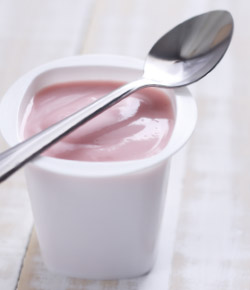Will carrageenan remain in organic food?
by Linley Dixon, Ph.D.
This article was originally published in August 2016

A version of this article was published originally in the summer issue of The Cultivator, The Cornucopia Institute’s quarterly newsletter.
The U.S. Food and Drug Administration (FDA) is responsible for ensuring the safety of more than 9,000 food additives used in non-organic foods, a number former Deputy Commissioner Taylor admits is beyond the agency’s capacity.
Evaluating the continued use of food additives in organic food is the responsibility of the National Organic Standards Board (NOSB), which sets a much higher bar according to regulations established by the Organic Foods Production Act (OFPA) of 1990. This year, assessing carrageenan for whether or not it should be continued to be allowed in organic foods is on the NOSB’s agenda. Carrageenan commonly is found in dairy products, deli meats, salad dressings, toothpaste, pet food and vegan products.
Carrageenan is considered a “synthetic substance” due to its extraction process from red seaweed and must be reviewed by the NOSB every five years, according to the OFPA. Carrageenan’s use as an emulsifier and thickener is highly controversial because independent research indicates it triggers inflammation and is a possible carcinogen.
To remain on the National List of materials allowed in organic production, carrageenan must meet all three OFPA criteria: 1) essential to organic products; 2) safe to humans and the environment; and 3) compatible with organic practices. After assessing public comments at two semi-annual meetings, the NOSB will vote this fall to determine whether carrageenan should remain on the National List.
The Cornucopia Institute, along with several farmer and consumer groups, testified at the spring NOSB meeting that carrageenan does not meet the OFPA criteria. PCC also submitted comments in 2012 when it was first reviewed for use, and again this past spring.
Decades of independent research demonstrate carrageenan’s role in inflammation, colitis, cancer and diabetes. A number of labs around the world have studied the inflammatory effects of carrageenan and approximately 10,000 references occur in PubMed when “inflammation and carrageenan” is searched.
Industry lobbying
Several groups that profit from carrageenan, including carrageenan manufacturers, food processors, and hired lobbyists and scientists, lined up for public comment to assure NOSB members that “food-grade” carrageenan is safe and that those stating otherwise were citing bad science and “fear-mongering.”
Not one scientist or industry representative testified in support of the safety of carrageenan who doesn’t stand to profit from its use.
The trade group for carrageenan manufacturers (Marinalg) has concluded it “could not reliably determine” the levels of non-food-grade (“degraded”) carrageenan in products, and that industry data from 2005 revealed levels of degraded carrageenan contaminate all food-grade carrageenan.
The industry is leading a coordinated effort to discredit public research. These tactics resemble those of the tobacco and fracking industries and must not go unchallenged. More than a dozen industry-funded scientists and representatives presented testimony in-person at the NOSB meeting.
Independent research
Quality, peer-reviewed, published research exists that demonstrates the mechanisms by which carrageenan can cause harm to human health.
Several studies show harm in normal human colonic epithelial cells resulting from consuming amounts less than those in the typical diet. Yet the industry-disseminated propaganda was repeated in the summary on carrageenan presented by an NOSB member leading the carrageenan review. This NOSB member repeated the industry line that public research had not been repeated, despite Cornucopia’s testimony citing published work.
The published research on carrageenan was presented to the NOSB as “split,” suggesting there are just as many studies pointing to its safety as there are those indicating harm.
The NOSB lead failed to point out, however, that every study demonstrating carrageenan’s safety is funded by the carrageenan industry. In contrast, there are thousands of studies done by independent labs using food-grade carrageenan to cause inflammation.
Cornucopia’s testimony — and PCC’s comments — to the NOSB pointed to research showing food-grade carrageenan always contains a percentage of the harmful, carcinogenic degraded form of carrageenan.
The industry doesn’t readily admit that the food-grade carrageenan doesn’t preclude the presence of smaller amounts of harmful, degraded forms. The presence of degraded carrageenan in food-grade carrageenan is confirmed publicly and by industry-funded studies. Many labs around the world continue to investigate the effects of carrageenan in the diet.
Over the last three years, Cornucopia has gathered information from more than 1,300 individuals, sharing medical details regarding better health after removing carrageenan from their diets.
Carrageenan standard at PCC
PCC does not accept new organic foods with carrageenan. Existing products have been grandfathered in but have to measure up against other items during regular category reviews. Conventional foods may continue to contain this synthetic additive.
Linley Dixon, Ph.D., is the Farm and Food Policy Analyst at The Cornucopia Institute.
